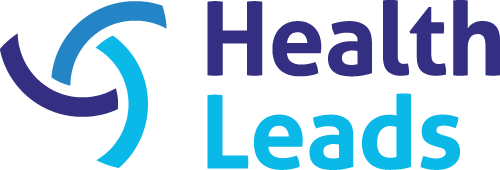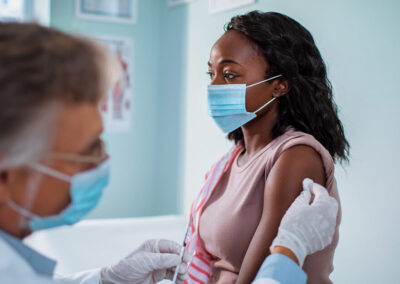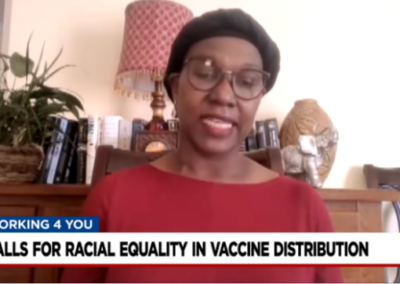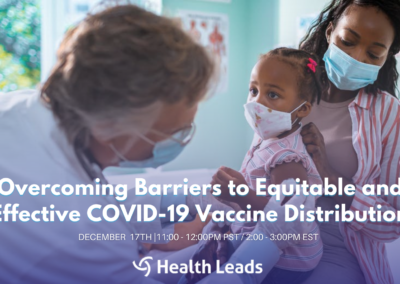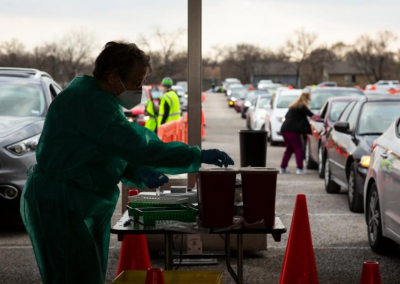Local Workforces, Community Advocacy and Trusted Messengers: Bright Spots in COVID-19 Vaccine Distribution
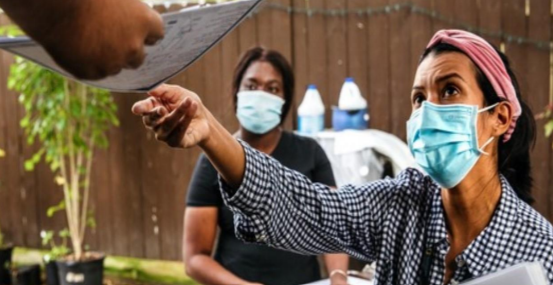
Above: Maria Plata, a Health Promotora, goes door-to-door providing residents with information about how to protect themselves from COVID-19 in Immokalee, Fla. Photo by Scott McIntyre for Partners In Health
Jacquelyn Dalton, MPH, Director of Community Engagement, Health Leads
Katie Bollbach, MPH, MPA, Director, US Public Health Accompaniment Unit, Partners In Health
Denise Octavia Smith, MBA, BS, CHW, PN, SFC, Executive Director, National Association of Community Health Workers
The rollout of COVID-19 vaccines in many areas of the U.S. has felt uncoordinated and inequitable, with inconsistent and rapidly-changing rules, processes and communication. And while data on race/ethnicity is only available for 58% of the vaccinated population, the data we do have indicate white people continue to be vaccinated at nearly three times the rate of people of color.
When we issued our co-created Principles for Equitable Vaccine Distribution, we predicted that the most equitable and effective vaccination efforts would be those centered on three core elements: (1) building trust, (2) investing resources, and (3) expanding access. They would also be hyper-local, and rooted in existing community-based data, networks and workforces. As examples of vaccine distribution from across the U.S. began reaching our collective group, many have confirmed our hypothesis.
The standout stories below all include targeted, community-specific planning, process, and outreach that leads to increased vaccination readiness and access. These bright spots also offer approaches that can be replicated in other communities.
Immokalee, Florida: Inaccessibility does not equal hesitancy
Of Immokalee, Florida’s 25,000 residents, 70% work in the labor industry and the majority are migrant farmworkers. Inequities in the community, including limited access to healthcare and poor health outcomes, stem from a long history of exploitation and slavery in the agricultural industry. With multiple households often living in a single trailer, crowded living conditions enhanced COVID-19 transmission, and many individuals faced eviction and food insecurity after missing work due to infection.
The Department of Health in Collier County––where Immokalee is located–– originally rolled out a vaccination process that included significant barriers for the Immokalee community: online, English-only appointment registration systems, vaccine events hosted during work days, lack of transportation to vaccine events and lack of linguistically accessible information.
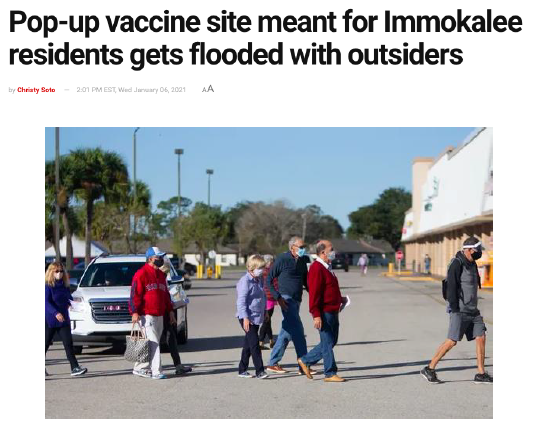 In response, Healthcare Network, the Coalition of Immokalee Workers, Mision Peniel and Partners In Health created a vaccination approach with a focus on the “extra mile” of vaccine readiness – helping to overcome the structural and economic barriers to vaccine access. The approach centered on partnering with locally-recruited Health Promotoras, who act as a bridge between the healthcare system and community by conducting household visits, supplying transparent COVID-19 vaccine information, providing COVID-19 testing in local neighborhoods, and helping residents sign up for and get to vaccination appointments. They also serve as navigators to connect individuals to social support, such as rental assistance, food, and medicines. Health Promotoras also raise awareness of underlying structural causes of health inequities by engaging in conversations to explore and understand the barriers that people face to receiving health care, and how the community and health providers might respond to facilitate access.
In response, Healthcare Network, the Coalition of Immokalee Workers, Mision Peniel and Partners In Health created a vaccination approach with a focus on the “extra mile” of vaccine readiness – helping to overcome the structural and economic barriers to vaccine access. The approach centered on partnering with locally-recruited Health Promotoras, who act as a bridge between the healthcare system and community by conducting household visits, supplying transparent COVID-19 vaccine information, providing COVID-19 testing in local neighborhoods, and helping residents sign up for and get to vaccination appointments. They also serve as navigators to connect individuals to social support, such as rental assistance, food, and medicines. Health Promotoras also raise awareness of underlying structural causes of health inequities by engaging in conversations to explore and understand the barriers that people face to receiving health care, and how the community and health providers might respond to facilitate access.
Key elements of the Health Promotoras approach to build trust, increase access and invest resources include:
- Identify eligible Immokalee residents interested in being vaccinated through testing events, home canvassing, visits to churches, interviews on local radio stations, and handing out information at food distribution events.
- Host vaccination events in easy-to-reach locations at convenient times – no appointments or documentation necessary; promote through various local and social media channels.
- Call eligible patients directly and schedule appointments with reminders – and visit households of patients with no phone number or no answer.
- Call farmers/growers to schedule mass appointments for farmworkers and packing house workers.
- Help with additional paperwork and registration before vaccinations are administered.
- While canvassing to register people and during events, identify people with resource, language, and literacy needs and connect them to clinical care and social support.
- Transport workers by bus to vaccination events; personally transport residents to vaccination sites.
- Accompany residents throughout the vaccination process to build trust by providing socially, linguistically, and culturally-accessible information.
Next steps for the Immokalee collaboration include utilizing a mobile testing unit as a mobile vaccination unit to help bring vaccines into residential areas, local organizations, and marketplaces to increase access to services for the community. Through this combination of trust, resource navigation and access-building, Immokalee’s health promotoras continue to bring vaccine efforts closer to the community.
San Diego, California: Local resource data targets vaccination gaps
211 San Diego is a free, 24/7 service, 3-digit dialing code offering communities access to health, social and disaster services. Tailored programs take the client beyond just a referral and into a Community Information Exchange (CIE), an ecosystem of partners that fosters collaboration across multidisciplinary networks. The CIE connects 104+ organizations through direct system access or data integration between systems and helps communities move from reactive to proactive, person-centered systems of care.
In partnership with the County of San Diego HHSA, 211 San Diego is providing vaccination access support including navigation of COVID-19 related information; navigation and connection to community, health and social services; testing site and appointment support and outreach; and vaccination appointment support for those without access to the internet or someone to help them.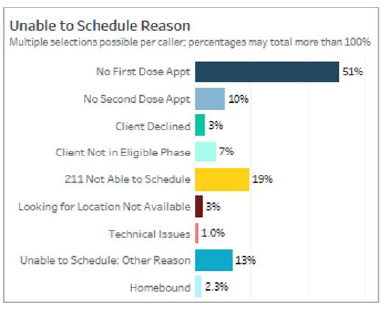
San Diego’s biggest challenges were in supply (availability for first and second dose appointments and completing a 2nd Dose Online Form), location (understanding sites in communities with most need) and appointment access, verification, rescheduling (requirements of email and phone number and social security numbers). Finally, accessibility was broadly hindered by a number of factors including lack of in-home vaccinations for homebound individuals, limited access to information that did not require a computer or internet, language barriers, ability to check appointment availability and transportation assistance.
When vaccination sites began to open, 211 San Diego received its highest volume of inbound calls in its history – 14,000 calls in one day inquiring about how to make appointments. The team’s CIE system enables it to collect and track vital trend data about barriers to vaccine access to inform key stakeholders. By asking detailed questions about why people were unable to make appointments, against race/ethnicity and zip code data, 211 San Diego could better gain a deeper understanding of unmet needs in specific populations and neighborhoods. The CIE allowed service provider partners to send a referral directly to 211 to help those with complex needs or barriers to access.
Among eligible callers, 61% were unable to make an vaccine appointment, with up to a third lacking a requirement needed to secure an appointment at some sites. The 211 San Diego team discovered 1 in 3 vaccine-eligible callers did not have email, 1 in 7 did not have a cell phone, and 1 in 11 did not have a social security number. Heat maps of these challenges enabled the team to geographically pinpoint specific communities that were most impacted by appointment barriers. Sharing these vaccine call trends played a key role in shaping the vaccine registration requirements at both the county and state level. Stakeholders gained a better understanding of where existing systems inherently block communities from vaccine access.
Recommendations from the 211 San Diego team include:
- Collect, monitor and share data (loudly!)
- Leverage existing infrastructure, providers, and partnerships (trusted networks like San Diego’s CIE)
- Set aside appointments for target populations
- Offer no-appointment sites
- Create population-friendly sites (signage, chairs, shade, low volume, dimmed lights, concierge services)
- Develop electronic workarounds (emails/cell numbers)
- Ensure confidential / anonymous answers
- Streamline appointment-setting softwares
- Offer transportation (with signage for ride share programs)
- Be nimble and transparent
Key Approaches that Create Vaccination Bright Spots
While these are not the only models of community- and equity-centric vaccine distribution, both reinforce many of the elements of our principles. They are also useful examples of the elements that should be replicated for building strong public health and racial health equity systems broadly – beyond vaccine distribution. These leading and exemplary efforts are two of many that continue to arise across the U.S. with commonalities in their approaches, including:
- Targeted focus on communities and responsive to individual needs using 1:1 conversations
- 1:1 or small group technical assistance for vaccine readiness conversations, scheduling appointments and managing paperwork
- Pairing vaccination effort with social needs resources (clinical care, child care, food, job and other socioeconomic resources)
- Familiar community, neighborhood locations as vaccination sites
- Appointment availability outside of 9-5 work hours and on weekends
- Trusted messengers and media to share vaccine education and availability of vaccines as a strategy to increase readiness
- Trusted community leaders as health education liaisons and navigators
- Breaking down technology (internet and cell phone access) barriers
Learn more about the Vaccine Equity Cooperative and support the effort to uplift bright spots in equitable vaccine distribution:
- Share your own bright spot!
- Check out our recent bright spot webinars
- Support our principles
- Join our mailing list.
